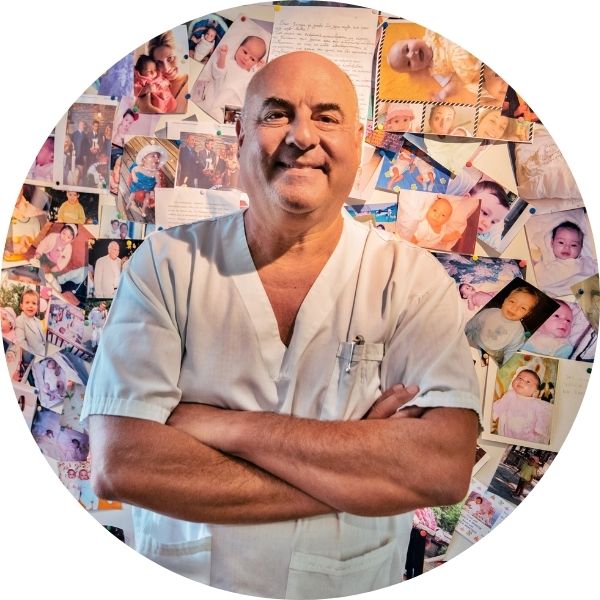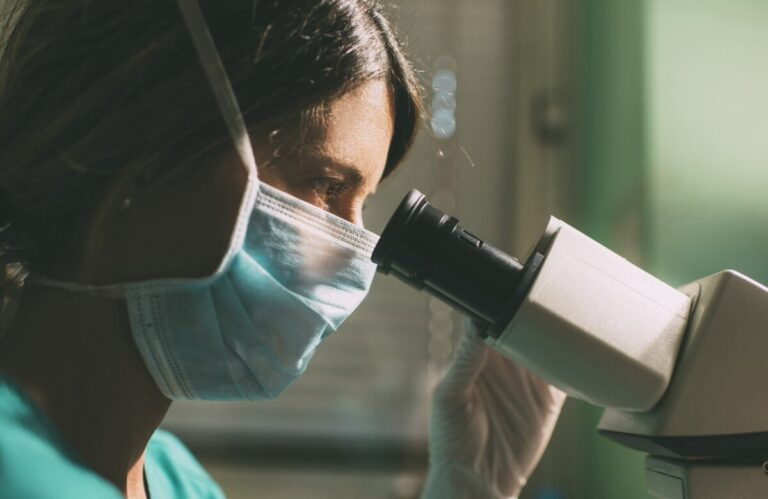Why do Patients from the UK Choose Greece?
More and more patients from the UK are choosing Greece for medical treatments, especially for fertility treatments like IVF. One of the main reasons is the combination of high-quality care and significantly lower costs. Greek clinics are known for their advanced technology, experienced specialists, and personalised attention, often with English-speaking staff trained abroad and direct connections to the UK. Patients can avoid the long waiting lists and begin treatment almost immediately, making the experience smoother and less stressful as there is no time to lose during fertility treatments.
Greece also stands out for its advanced fertility legislation and patient-friendly approach. Treatments such as egg donation are legal and anonymous, and open to patients up to the age of 54. There are no marital status requirements, making Greece an inclusive option for single women and same-sex couples.
Another reason why many patients from the UK choose Greece for their Fertility Journey abroad is the charm of the landscapes, culture and gastronomy. If your journey takes you abroad, the least you can do is to try to make your stay as pleasant as possible. Many patients take the chance to add a few extra days to their stay and use the vacation to reduce some of the stress that can come with the start of an IVF treatment.
IVF Legislation in Greece
The IVF Legislation in Greece is one of the most advanced and inclusive ones worldwide and stands out among others in Europe. It begins with the age limit, which in many countries is around 50, but in Greece it is 54. Treatments for women in the age range of 50–54 require special approval from the Greek National Authority of Assisted Reproduction, but are possible.
All treatments in Greece are available for married, non-married couples (with a notarised declaration) and single women. That also includes lesbian couples, who can opt to do an IVF with donor sperm or ROPA treatment.
Treatments with egg or sperm Donations are available, and the anonymous donors have to fit very specific requirements. Starting with the age limit, which is 35 for egg donors and 40 for sperm donors.
One of the latest Greek laws on reproductive medicine sets specific limits on the number of embryos that can be transferred during a cycle of an IVF treatment. Here is an overview of the allowed number of embryos depending on each case:
- Women under 35 using their own eggs: up to 1 or 2 embryos each cycle
- Women aged 35–39 using their own eggs: up to 2 embryos in the first two cycles, and up to 3 embryos from the third cycle onwards.
- Women aged 40 using their own eggs: up to 3 embryos
- Women over 40 using their own eggs: up to 4 embryos
- All age groups using donor eggs: up to 2 embryos
Advanced techniques such as PGD are allowed to prevent transmission of specific genetic diseases (e.g., cystic fibrosis, thalassemia). They are not allowed for non-medical reasons, including sex selection for family balancing, which is strictly prohibited.
Allowed in Greece
- IVF for married couples, unmarried couples, and single women
- IVF up to 54 years old (50–54 with approval)
- Egg, sperm, and embryo donation (anonymous only)
- Embryo freezing and storage (up to 10 years with permission)
- Embryo donation and double donation
- Altruistic surrogacy (with court approval)
- PGD (Preimplantation Genetic Diagnosis) for genetic disease prevention
- Transfer of:
- Up to 2 embryos (own eggs, women <40 and in case of donor eggs)
- Up to 3 embryos (own eggs, women 40, 35-39 if >3 cycles)
- Up to 4 embryos (own eggs, >40)
Not Allowed in Greece
- IVF for women over 54 years old
- Non-anonymous egg/sperm donation
- Commercial surrogacy (no profit allowed)
- Sex selection (except for serious hereditary diseases)
- PGD for non-medical reasons (e.g., choosing gender for family balancing)
- Treatment without informed consent or legal documentation
IVF with Own Eggs for Patients Over 40 in Greece
When a woman finds out she can’t get pregnant naturally, due to her partner or due to her own reproductive health, the first reaction is to try IVF with her own eggs. A way to get help in a process that is not only stressful but also difficult on an emotional and often also physical level.
Nowadays, despite the advances in the field of reproductive medicine, many clinics in the UK and Europe limit access to IVF with their own eggs for women over the age of 40. After making the hard decision to seek help and start a fertility treatment, a woman in her 40s is not given the chance to try IVF with her own eggs, which can mean the end of the dream of motherhood. Because not everyone is ready to accept donor eggs or other alternatives right away. That is one of the many reasons why clinics in Greece like EmBio understand their patients’ needs and support them according to their expectations. They not only help patients over 40 to achieve a healthy pregnancy, but also try always to first offer the option with their own eggs, under the correct medical circumstances, of course.

How do you manage IVF for patients over 40 who wish to use their own eggs?
“Although IVF success rates with a patient’s own eggs decline significantly after age 40, we support each woman’s choice with honesty, empathy, and advanced science. If a patient wishes to proceed, we leave no stone unturned — using the latest technologies in ovarian stimulation, genetic screening, and lab protocols — to maximise every chance of success, however small.”
Dr Thanos Paraschos, EmBIO Athens
Main Drivers for UK patients – Why They Go to Greece
When Patients choose the ideal destination to start their fertility treatment abroad, they always make a pro and con list. The pro list, when it comes to Greece as a destination for UK patients, is one of the longest ones.
We are going to have a look at the most common pros:
One of the most important reasons is the cost of the treatment and everything that ends up adding to it. An IVF treatment is often an expensive procedure, as many add-ons, visits, scans and medications increase the initial proposal. That is why Greece, with its lower costs and better overall quality in IVF treatments, is such an interesting option.
Before UK patients choose a treatment abroad, they often have already had more than 2 failed cycles back home. That is not only a big factor when it comes to their budget for a treatment, but also for the medical attention they need. Back in the UK, their chances are often limited because of the offered treatment options, the tests available and the overall quality of the procedures. Many patients get to the limit of the assisted reproduction offered and feel like their only option is to go abroad to find other solutions. In Greece the clinics have lots of experience and adapted protocols that are made to fit all patient profiles, so they get exactly the care they need.
While the UK is very advanced in many sectors, in the IVF sector, the pioneers are other countries, like Greece. That is not due to the medical sector itself, but to the legal circumstances, as in Greece, there are more treatment options allowed, and the investigations in the field are deeper.
Over the last decade, many new treatment procedures and techniques have opened doors for patients who have had no chance in their home countries. For example, donor procedures, such as egg or embryo donation, are available for everyone and have no waiting lists or long procedures that make the path to the desired pregnancy more difficult.
In many cases, where female infertility has been diagnosed, there are still options that lead to a successful pregnancy, but with procedures that the UK can’t offer due to the IVF legislation. That is also why Greece has better success rates in IVF treatments than the UK.
Not only do patients see those advantages and go to Greece because of it, but also the doctors and fertility experts who studied in the UK or worked there, end up going abroad to get a wider experience in the field of assisted reproduction. That is why it is easy to be treated by an English-speaking doctor who understands the UK parameters and medical situation. Many of the IVF Clinics in Greece have close connections to UK clinics and doctors, another advantage when it comes to beginning a treatment in Greece and going back home to prepare for the transfer.
Patients Over 50 are Welcome in Greece
In many countries, the treatments offered are only for patients up to 50, but as we mentioned before, Greece also offers treatments to patients up to the age of 54. Due to the egg quality of a woman that age, the treatment used to achieve a healthy pregnancy is usually egg donation. Thanks to the wide egg donor range, medical expertise and strict donor selection protocols, this treatment has high success rates. Also, the fact that there are no waiting lists is a big advantage in the case of older women, as they have no time to lose.

Why do so many women around the age of 50 choose Greece for their treatment?
“Greece offers one of the most progressive legal frameworks in Europe for fertility treatment, allowing women up to age 54 to undergo IVF. This, combined with our exceptional donor programs and long-standing expertise with older patients, makes us a trusted choice for women in their late 40s and early 50s.”
Dr Thanos Paraschos, EmBIO Athens
Treatment Availability in Greece
When it comes to treatment options and variety, Greece is one of the best IVF destinations. As we mentioned before, the age limit and advanced IVF legislation allow many patients to try treatments that would be impossible in the UK.
We will have a look into all the treatment options available, the patient group it is meant for, and the different complementary add-ons and techniques available.
IVF with own eggs
Characteristics:
- Ovarian stimulation and egg retrieval
- Fertilisation with the partner’s or donor’s sperm
- Embryo transfer based on age and treatment cycle
- Use of fresh or frozen embryos
Patient profile:
- Women under 54 with sufficient ovarian function
Egg Donation
Characteristics:
- Anonymous donor eggs fertilised with partner’s or donor’s sperm
- Uterine lining prepared for embryo transfer
- Embryo transfer limited depending on age and cycle (see above)
- High success rates due to good quality donor eggs
Patient profile:
- Women with low ovarian reserve or early menopause
- Women with health issues that affect their fertility
- Women with genetic risks
- Women over 40
- Couples with multiple failed IVF attempts
Sperm Donation
Characteristics:
- Anonymous donor sperm used for IVF or IUI
- Combined with either their own eggs or donor eggs
- Donors are under 40 and medically screened
Patient profile:
- Single women
- Lesbian Couples
- Couples with severe male infertility
- Couples with genetic risks from the male partner
Embryo Donation
Characteristics:
- Transfer of embryos created from anonymous donor eggs and sperm
- No genetic link to intended parents
- Requires uterine preparation for embryo transfer
Patient profile:
- Women or couples with infertility or genetic risks in both partners
- Single women who suffer from infertility or genetic risks
- Patients with repeated IVF and egg donation failures
Available Adds-Ons in Greece
Many patients underestimate the impact some add-ons can have on the success of a fertility treatment. In many cases of previous failed cycles in the UK, the add-ons and expertise of Greek Clinics make a big difference and can improve the treatment outcome.
ICSI (Intracytoplasmic Sperm Injection)
For male infertility or poor sperm quality, a single sperm is injected directly into the egg.
IMSI (Intracytoplasmic Morphologically Selected Sperm Injection)
Advanced sperm selection technique using high magnification.
PICSI (Physiological ICSI)
Sperm are selected based on natural binding to hyaluronic acid, mimicking natural selection.
Preimplantation Genetic Testing (PGT-A / PGT-M)
Screening embryos for chromosomal abnormalities or specific genetic conditions before transfer.
EmbryoGlue
Special medium used during embryo transfer to promote implantation.
Time-lapse Embryo Monitoring (EmbryoScope)
Continuous monitoring of embryo development to select the best-quality embryos.
Assisted Hatching
A small opening is made in the embryo’s shell to help with implantation.
Endometrial Receptivity Analysis (ERA test)
Determines the optimal window for embryo transfer based on endometrial gene expression.
Hysteroscopy
Diagnostic and sometimes therapeutic procedure to assess the uterine cavity.
Immunological Testing and Treatment
For recurrent implantation failure or miscarriage (e.g., NK cell testing, intralipids, steroids).
Platelet-Rich Plasma (PRP) Therapy
Used to improve endometrial thickness or ovarian function.
IVF Treatment in Greece – How Much Do UK Patients Pay
One of the main factors when it comes to the choice of a clinic is always the price. Fertility treatments are a big economic effort for many patients, which is why it is important to compare prices and analyse if going abroad is cheaper than trying a treatment at home. When it comes to Greece and the UK, the answer is easy: Greece is much cheaper. We have made a comparison between the most common treatments and add-ons to allow a better understanding of the differences.
Price Ranges for Treatments in Greece
- IVF with Own Eggs:
£2,150 – £2,600 (€2,500 – €3,010) – includes consultation, egg collection, ICSI (if needed), embryo culture, and embryo transfer. - Egg Donation IVF:
£3,900 – £4,750 (€4,500 – €5,500)- includes donor matching, screening, egg collection, ICSI, embryo transfer, and related expenses. - Embryo Donation:
£4,150 – £5,000 (€4,800 – €5,800) - Sperm Donation (IVF with donor sperm):
£2,400 – £3,000 (€2,800 – 3,480) - ROPA (Reciprocal IVF):
£2,150 – £2,600 (€2,500 – €3,010)
Add-On Treatments
- ICSI: Included in the package price
- Blastocyst Culture: Included in most packages, or £200 – £400 (€230 – €460)
- Vitrification (Embryo Freezing) + 1-Year Storage: around £450 (€520)
- Frozen Embryo Transfer (FET): £950 (€1,100)
- PGT-A (Genetic Testing): around £1,750 (€2,030)
- Assisted Hatching: around £430 (€500)
- Artificial Insemination with Donor (AID): around £430 (€500)
- Donor Sperm (separate cost): around £170 (€200)
Price Ranges for Treatments in the UK (Private Clinics)
IVF Treatment Costs
- IVF with Own Eggs: £5,000 – £7,000 (€5,800 – €8,100)
- Egg Donation IVF: £10,000 – £15,000 (€11,600 – €17,400)
Add-On Treatments
- ICSI: £800 – £1,200 (€930 – €1,400)
- Blastocyst Culture: £500 – £800 (€580 – €930)
- Vitrification + 1-Year Storage: £600 – £1,000 (€700 – €1,160)
- Frozen Embryo Transfer (FET): £2,000 – £3,000 (€2,300 – €3,480)
- PGT-A (Genetic Testing): £2,000 – £3,000 (€2,300 – €3,480)
- Assisted Hatching: £500 – £800 (€580 – €930)
Cost of the Additional Medications
When calculating the treatment cost, patients always have to count the costs of medications. Overall, the needed medications are much cheaper in Greece than they are in the UK, but the final cost will depend on the medical situation of each case. The medications in Greece cost around 600 to 1500 pounds. The team of the clinic where the treatment is done will help the UK patients to decide whether to buy the medications in Greece or not, they also get assistance with the indications and recipes needed in each case.
Why Athens is the Most Popular Destination in Greece for IVF Treatment
Greece has many great clinics and cities that offer high-quality IVF treatments, but without a doubt, the city that stands out is Athens. Not only because it is the capital and has all the conveniences a capital has to offer, but also because of the direct flight connections with Airports all over the UK, like we show you below:
Connection 1: London – Athens
Duration: 3.5–4 hours
Cost round trip: £69 – £103
Connection 2: Bristol – Athens
Duration: 3.4–4 hours
Cost round trip: £155 – £172
Connection 3: Manchester – Athens
Duration: 4 hours
Cost round trip: £172 – £215
Connection 4: Liverpool – Athens
Duration: 4 hours
Cost round trip: £215 – £258
Where to Stay?
During your visits to the clinic, you will need accommodation close by for a few nights. The offer of Hotels and accommodations in Athens is also very big, due to its tourist attractions and frequent travellers. Here are some price orientations of hotels and other options like Airbnb all over Athens.
4-Star Hotels
Double bedroom per night: £150 – £210
Examples:
Amalia Hotel Athens: from £150
Astor Hotel Athens: from £175
Candia Hotel: from £62
3-Star Hotels
Double bedroom per night: £135 – £140
Examples:
Athens City Hotel: from £60
Piraeus City Hotel: from £69
2-Star Hotels or Lower
Double bedroom per night: £48 – £86
Examples:
Adams Hotel: from £86
Delphi Art Hotel: from £48
Hostels or Similar (private rooms)
Double bedroom per night: £44 – £77
Examples:
Iconic Athens Hostel: from £44
Nubian Hostel: from £77
Airbnb
Double bedroom per night: from £16, average around £56 – £75, depending on location and amenities.

What makes Athens such a popular destination for UK fertility patients?
“Athens combines world-class fertility care with the warmth of Greek hospitality. At EmBIO, we’ve created a seamless experience for UK patients — from our internationally accredited clinic and English-speaking staff to short waiting times and significantly lower treatment costs. Patients often say they feel both medically secure and emotionally supported when they choose Greece.”
Dr Thanos Paraschos, EmBIO Athens
IVF Clinics in Athens – Get to Know EmBIO Clinic and Dr Thanos Paraschos
EmBIO Medical Centre in Athens is an internationally recognised fertility clinic founded in 1996 and known for its high success rates, advanced technologies, and extensive experience in assisted reproduction. The clinic is led by Dr Thanos Paraschos, an internationally recognised fertility expert with a wide experience in the field. EmBIO offers the fertility treatments mentioned in this article, including IVF, ICSI, egg and embryo donation, PGT-A (genetic testing), ROPA and fertility preservation. The clinic is equipped with state-of-the-art labs, provides short-stay options for international patients, and offers services in English to make it easier for patients from abroad, especially the UK. They also assist with travel, accommodation, and local logistics, making the process smoother for their patients from abroad. They understand their patients and make sure to meet their specific needs.
Resource for UK Patients Seeking IVF Treatments in Greece
Choosing a clinic and treatment option is a very complicated task, therefore, you need to be as informed as possible beforehand. We always recommend checking different types of resources.
Facebook pages and forums where you can speak to other patients who are in a similar situation to you, and maybe to some who already have experience going through a fertility treatment abroad:
- https://www.facebook.com/groups/IVFAbroad
- www.fertilityfriends.co.uk
- https://www.mumsnet.com/talk/infertility/4899071-ivf-greece
- https://www.netmums.com
Also, check official resources, from the UK and Greece, such as non-profit organisations or governmental pages:
Other helpful pages that have many interesting insights into treatment options, prices and clinic presentations:




